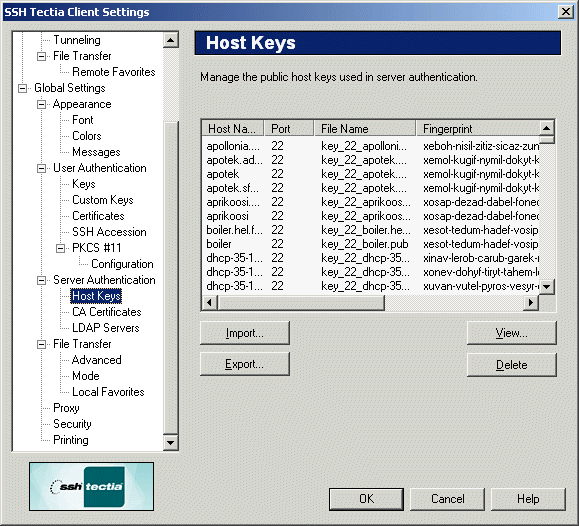|
Managing Host Keys
Public host keys used in server authentication (remote host
authentication) process can be managed using the Host Keys page
of the Settings dialog. The keys found in the local database are listed in
the host key file list.

Figure : The Host Keys page of the Settings dialog
Public host key file list
The host keys in your possession are displayed in the public host key
file list (located above the buttons on the Public Keys page).
- Host Name
The Host Name column displays the host names of your host keys.
From SSH Tectia 4.3.3 onwards the host key does not contain the host name or
port.
- Port
The Port column displays the ports used by the connections
associated with each host key. From SSH Tectia 4.3.3 onwards the host key does
not contain the host name or port.
- File Name
The File Name column displays the file name of each host key file.
- Fingerprint
The Fingerprint column displays the fingerprint of each host key file.
The fingerprint is represented using the SSH Babble format, and it consists of
pronounceable sets of five lowercase letters separated by dashes.
Buttons:
- Import...
Click Import... to import a host key. The Import Hostkeys -
Select Files dialog opens, allowing you to locate the host key to
be imported.
- Export...
Select a host key and click Export... to export a host key.
The Select Folder dialog opens, allowing you to specify the
target location.
- View...
Select a host key file from the host key file list and click
View... to display a host key. Alternatively, you can just
double-click the key file name.
- Delete
Select a host key file from the host key file list and click
Delete to remove the key.


 [Contents]
[Index]
[Contents]
[Index]
[ Contact Information | Support | Feedback | SSH Home Page | SSH Products ]
Copyright © 2010 SSH Communications Security Corp.
This software is protected by international copyright laws. All rights reserved.
Copyright Notice
|
 |